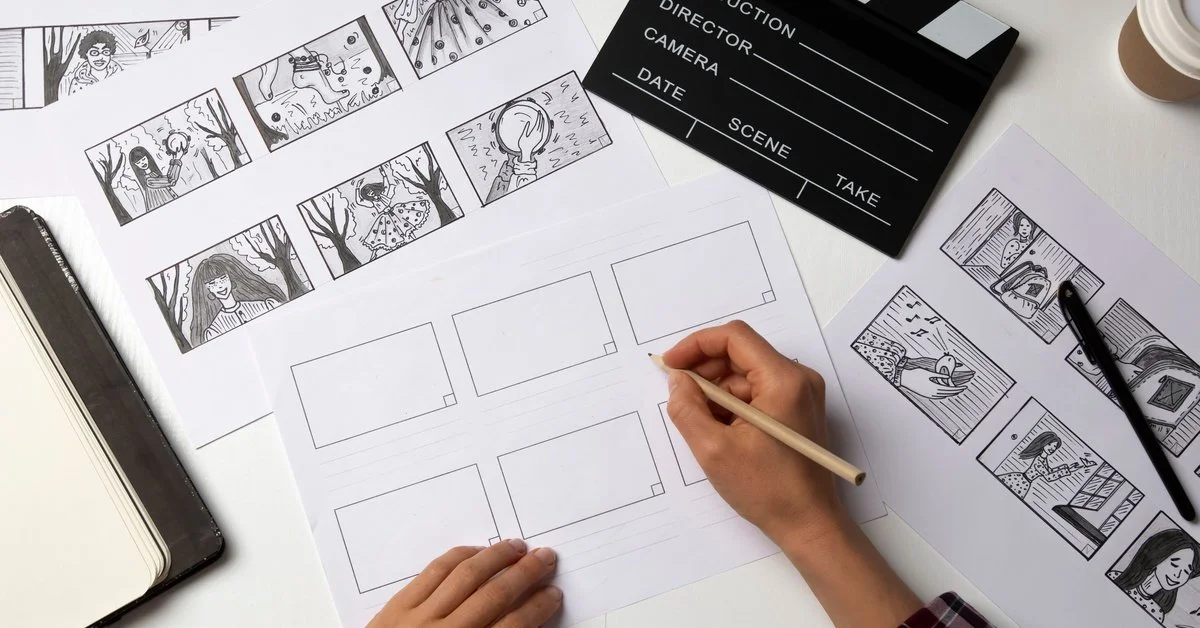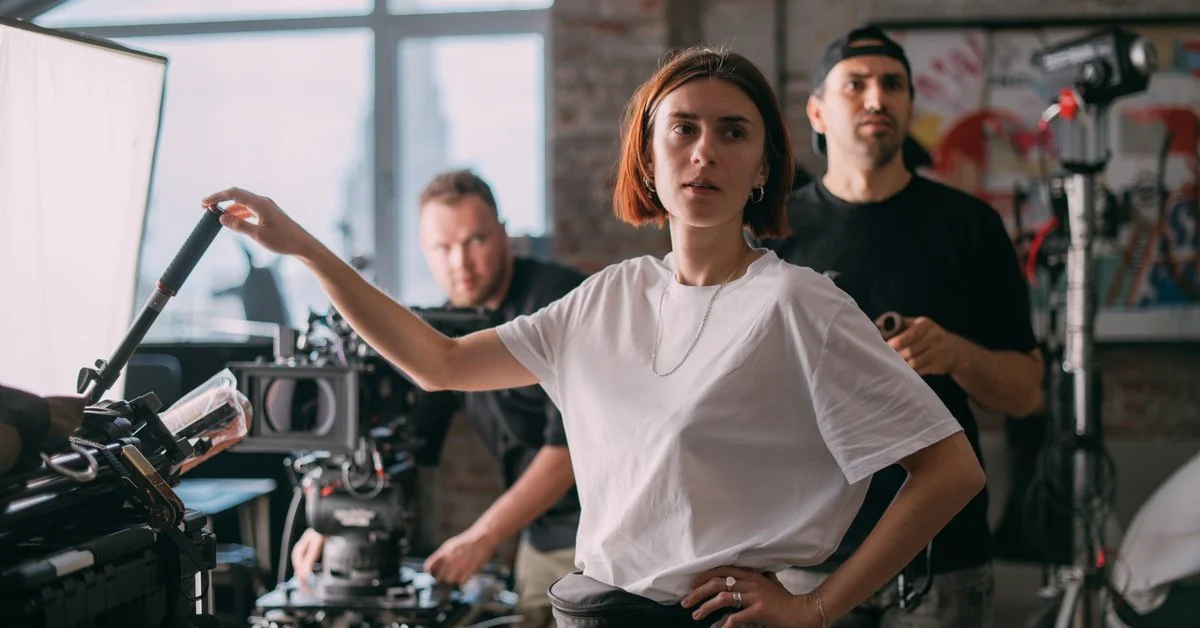11 Tips for Making Your Film Production Timeline
Bringing a music video or film project to life is an art. However, beneath the artistry lies the architecture of a carefully constructed production timeline.
Every hour saved and every detail dialed in becomes the difference between hassle and harmony when time is tight, and the stakes are high. Use these eleven tips to make your film production timeline and keep your project moving smoothly.
1. Understand the Scope of Your Project
Immerse yourself in the scope of your film before building your timeline. Consider the magnitude of your story, every shooting location on your wish list, the size and experience level of your cast and crew, and the technical complexity of your desired visual style.
For example, a moody scene shot across Nashville’s iconic honky-tonks will demand more detailed logistics and local knowledge than a single-location narrative. The more clarity you have upfront, the more precisely you can plan, ensuring no aspect goes unnoticed, from call sheets to craft services.
2. Break Down the Script
A thorough script breakdown is particularly helpful during pre-production. Methodically go through your script scene by scene, identifying every element required for each moment on screen. Note props, wardrobe, special effects, extras, and even weather if your film involves outdoor shots.
For instance, you’ll need contingency plans for rain and humidity if you’re scheduling a shoot during storm season. The more detailed your script breakdown, the easier it becomes to assign realistic time allocations, anticipate potential challenges, and delegate responsibilities across your team.
3. Organize a Strong Pre-Production Process
Meticulous pre-production is as crucial as the shoot days themselves. Develop a master checklist for essential preparatory work, including casting, location scouting, permit applications, and insurance. Missing even a single milestone here may set off a domino effect, causing ripple delays throughout your timeline.
Working with a reputable video production studio in Nashville ensures local expertise handles permitting, crew booking, and equipment sourcing with precision and insight from locals, especially for out-of-town producers. Investing time in robust pre-production streamlines later stages and paves the way for creative focus when cameras roll.
4. Set Clear Priorities
Understanding and articulating your project’s must-have elements empowers you to make critical decisions under pressure. Not every shot captures the same amount of magic, and time on set is often limited. Decide which scenes, shots, or effects are essential to the storytelling and which are flexible.
For example, rally your crew to protect the golden hour window if a golden-hour rooftop sequence is the heart of your scene. By prioritizing early, you provide flexibility when something unexpected derails a portion of the day, ensuring you still capture the footage that matters most to your project.
5. Account for Your Budget
Budget and timeline are inseparable; every creative choice has a financial implication. An ambitious multi-location shoot spanning legendary venues may add allure, but it also incurs expenses for transportation, location fees, overtime, and gear rental. Align your schedule with your available resources by identifying areas where you can gain efficiency without sacrificing quality.
Sometimes, grouping scenes by location or reworking shot lists avoids costly resets and multiple location moves. Being transparent about your budget from the start makes it easier to avoid expensive last-minute decisions and enables you to deliver the production value that sets your work apart.
6. Book Talent and Locations Early
Securing key talent and choice locations early is vital for keeping your timeline on track. Nashville’s vibrant music and film scenes mean that producers may have booked out top venues, local musicians, and talented crew months in advance.
Don’t risk your schedule unraveling due to a last-minute scramble; start conversations with agents, managers, and venue coordinators as soon as you lock down your script. Early bookings increase your chances of access and position your production as serious and professional, often opening doors to additional resources and local goodwill.
7. Create a Realistic Shooting Schedule
Compressing too many scenes into one day is a recipe for fatigue, mistakes, and diminishing returns. Respect the rhythms of your cast and crew by crafting a shooting schedule that considers setup time, blocking, lighting changes, and much-needed breaks.
Always anticipate the need for retakes and adjustments—even a perfectly planned shot list can run long due to technical tweaks or creative inspiration. Don’t rush for perfection, and adopt a considerate mindset to make your film production timeline. Create a supportive and energized environment by scheduling scenes with buffer zones and breathing room, enabling everyone to deliver their best work.
8. Build in Buffer Time
The realities of production easily break a rigid timeline. Unexpected weather, technical glitches, and creative detours are inevitable. That’s why building buffer time into your schedule is essential.
Add contingency days where possible or flexible windows for complex scenes. You may have a spontaneous addition or new creative sparks; padding your schedule makes space for these moments while protecting critical deadlines.
9. Keep Communication Centralized
The best timelines are only as good as the communication behind them. Establish one centralized hub for all communication and document sharing, whether a project management platform, a shared drive, or a group chat app.
Regular check-ins, shared calendars, and clear responsibilities ensure no detail gets lost between remote producers and local crew. Prioritizing transparency keeps the entire team aligned, heads off misunderstandings, and builds trust. This cohesion is palpable on set and translates to smoother, more efficient production days.
10. Plan for Post-Production Early
It’s easy to focus so intently on principal photography that post-production becomes an afterthought. Yet editing, color correction, sound design, and VFX often take longer than scheduled. Map out these phases as soon as possible, setting milestones for rough cuts, client feedback, and final delivery dates well before you wrap shooting.
Out-of-town projects may face additional logistical challenges, such as shipping drives or scheduling remote sessions with editors. Incorporate your post-production team early and often to close gaps that may otherwise cause costly delays, delivering the final product when it matters.
11. Review and Revise
No timeline is set in stone. As your project progresses, schedule regular reviews after achieving major milestones. Assess what’s working, pinpoint bottlenecks, and adapt your plan as needed.
Flexibility is your greatest ally when shooting. Adopt a mindset of ongoing refinement, embracing feedback from your team as new challenges emerge. This culture of adjustment keeps your timeline on track and ensures your project remains resilient through the inevitable twists and turns of production.
Delivering a film project that meets your creative aspirations while respecting time and budget boundaries is a rewarding challenge. Each of these tips, from script breakdown to schedule reviews will empower you as a producer in Nashville’s vibrant creative landscape.
If you’re searching for dedicated partners, consider collaborating with us as your video production studio in Nashville. We understand the local rhythm and the standards of global productions. With a team of seasoned professionals by your side, you’ll transform plans on paper into unforgettable moments on screen.



